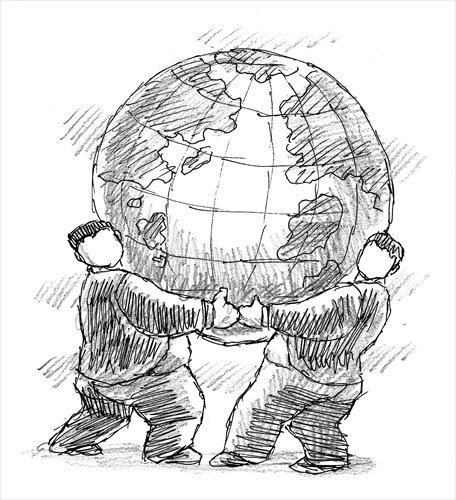HOME >> BUSINESS
China, US need to focus on shared interests
By Zhang Yugui Source:Global Times Published: 2015-9-23 23:23:01
Together, two nations can be anchor of global economy

Illustration: Peter C. Espina/GT
Under the framework of global economic integration, China and the US as the world's two largest economies, have gradually increased their cooperation on regional and global issues.
No one doubts that China will one day become the biggest investor in the US. In terms of issues at the global level, such as economic growth, financial market stability, and restructuring of new rules of trade, China and the US have plenty of common interests, as well as common challenges. Thus, no matter how complicated the contradictions between them may be, the two nations should join hands to deal with the issues that bind them together.
Compared to seven years ago, bigger cracks seem to have appeared in the global economy. Seven years ago, the global financial crisis set off by the collapse of Lehman Brothers hit those economies with weak ability to resist such shocks. As of today, those countries still haven't fully recovered, and the quantitative easing policies initiated by some major developed countries have injected new uncertainties into the global economy.
In the past seven years, even though China and the US have seen a decline in overall economic performance, they have still ranked highest among the world's top 10 best performing economies. No other economy has contributed as much as China's to world economic growth. As for the US, even though it implemented a series of quantitative easing policies that were much-derided and made bilateral and multilateral movements that strategically weighed on the Chinese economy, economic cooperation with China is still seen as vital by the vast majority of US business leaders, who have high expectations for the economic benefits from the China-US bilateral investment treaty (BIT).
Executives at Goldman Sachs regard the BIT as a historic opportunity to boost relations between the two countries and tech giants such as Apple Inc have increasing interest in the Chinese market.
China today is no longer a net capital importer, and has begun to acquire the capability to allocate resources globally. Statistics from the US Department of Commerce have shown that Chinese investment in the US in 2014 exceeded $9.5 billion, 20 times more than the amount when China joined the World Trade Organization (WTO) in 2001. And in the first half of 2015, investment from China to the US reached $6.4 billion.
Against the background of an unstable global economy, with both nations' economies facing difficulties, President Xi Jinping's State visit to the US signifies a gesture of willingness to shoulder international responsibility. Admittedly, conflicts of strategic interests do exist in Sino-US relations, but they are normal between the two countries and there is no need to dodge the issue.
But recently, the US has expressed increased concerns over the development of Sino-US relations. In the country's domestic debate about its strategies toward China, a number of scholars and members of the political elite have said that it will be hard to find solutions to Sino-US bilateral disputes that are in line with both countries' interests in the short term. There have even been suggestions of an anti-US conspiracy in the China-initiated Asian Infrastructure Investment Bank (AIIB) and the BRICS New Development Bank (NDB). But in fact, apart from the economic and political interdependence of China-US relations, the two nations have been cooperating more and more on regional and global issues, and they share increasing common interests and are confronted with more common challenges.
Chinese decision makers and business leaders know well that national interest is always the first priority for the White House and Wall Street financial firms in their economic policies toward China, and the US still has a lot of economic tools at its disposal. In the short term, China will not have the power to fully surpass the US in manufacturing, finance or the global value chain. The turbulence in the Chinese stock market over the past three months has shown that there is still a long way to go for China to establish a strong capital market. To initiate new reforms at its State-owned enterprises (SOEs), China needs to learn from the market experience of the US.
Despite the complexity of Sino-US relations, farsighted politicians and business leaders in the two nations will try to emphasize the common interests they face, and avoid triggering strategic conflicts between the two countries. To address issues such as global economic growth, financial market stability, re-building of trade rules and their own domestic economic problems, both China and the US will surely focus on their common interests so that they can be the anchor of the global economy and financial market.
The author is dean of the School of Economics & Finance at Shanghai International Studies University. bizopinion@globaltimes.com.cn
Posted in: Expert assessment